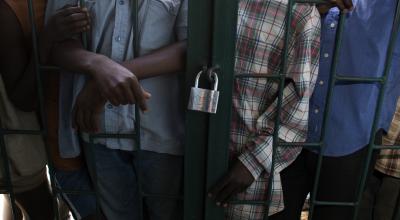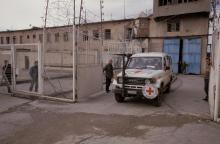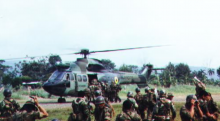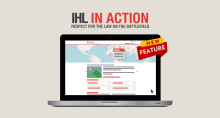Basic international humanitarian law (IHL) rules applicable to this situation:
Detainees must be provided with adequate food, water, clothing, shelter and medical attention.
In international armed conflicts, the ICRC must be granted regular access to all detainees to monitor their detention conditions and to restore contacts between detainees and their families.
In non-international armed conflicts, the ICRC may offer to visit all persons detained in connection with the conflict to monitor their detention conditions and to restore contacts between detainees and their families.
Prisoners of war must be released and repatriated without delay after active hostilities cease.
Civilian internees must be released as soon as the reasons which necessitated internment no longer exist, and as soon as possible after active hostilities cease.
Persons detained in connection with a non-international armed conflict must be released as soon as the reasons for detaining them cease to exist. Such detainees may continue to be held if penal proceedings are pending against them or if they are serving a sentence lawfully imposed.
The case in brief
In 1998 a complex armed conflict developed in the Democratic Republic of the Congo (DRC). It was fought between armed forces loyal to the DRC government, with support from Angola, Namibia and Zimbabwe, and opposition forces comprising Congolese non-state armed groups, supported by Burundi, Rwanda and Uganda. All parties took prisoners of war (PoWs).
In 1999 the parties signed the Lusaka peace agreement, including a commitment to release POWs. With support from the United Nations (UN) Security Council, among others, the DRC released hundreds of detainees in 2000.
IHL compliance highlights
- In 1999, representatives of Angola, the DRC, Namibia, Rwanda, Uganda and Zimbabwe signed the Lusaka Ceasefire Agreement, committing to ending hostilities among all their forces in the DRC. Under the agreement the parties undertook to exchange PoWs and release any other people detained in connection with the conflict.
- The parties granted the ICRC regular access to PoWs to monitor their conditions during captivity.
- In 2000, the DRC government announced an amnesty, leading to the release of more than 100 political detainees. Upon the subsequent release of 177 Namibian, Rwandan and Zimbabwean PoWs, the ICRC repatriated them to their respective countries at the request of the relevant authorities.
Case prepared by Jason DePatie and Molly Wooldridge, J.D. students at Emory University School of Law, under the supervision of Professor Laurie Blank, Emory University School of Law; with the contribution of Jemma Arman and Isabelle Gallino, LL.M. students at the Geneva Academy.
A. THE LUSAKA CEASEFIRE AGREEMENT
B. A JOINT GOVERNMENT COMMISSION DECIDES WHO SHALL BE RELEASED
"This is a significant step forward and the Congolese government must be commended for it," said Peter Takirambudde, Executive Director of the Africa Division of Human Rights Watch, "We urge the Congolese government to keep moving in this direction and to promptly release those who are still wrongfully detained."
Forty-nine prisoners, many of them soldiers of the former Congolese army, were freed in mid-March.
Human Rights Watch has evidence of dozens of other prisoners held by President Kabila's government for the non-violent expression of opinion, and, in some cases, on charges or accusations of treason.
C. DRC RELEASES AND REPATRIATES 177 POW WITH ICRC HELP
Discussion
3. How are POWs to be treated? Can they be prosecuted for having participated in hostilities? (GC III, Art. 13; P I, Art. 43(2))
4. When shall POWs be released? When are active hostilities considered to have ceased? Is the establishment of a cease-fire sufficient? (GC III, Art. 118; CIHL, Rule 128)
5. Must POWs be exchanged or unilaterally released after the close of active hostilities? What are the risks of exchanging rather than unilaterally releasing POWs?
6. Does the ICRC have a right to access POWs? Does this apply to all POWs? And all detainees? (GC III, Art. 126; GC IV, Art. 143; CIHL, Rule 124)
8. How can MONUC help the implementation of the Lusaka Peace Agreement? How can such a United Nations mission help with the release of POW? In your opinion, what role can the Security Council have in the implementation of IHL?
9. Document C mentions the “joint government commission”: what is its role? Is this foreseen by the Geneva Conventions? What do you think of such a mechanism? What are the advantages? Do you see any problematic aspects?
10. Looking at Document D, which factors made the release of the 177 POWs possible? Do you think the releases would have happened without the cooperation of the four countries? Without the intermediary role of an impartial organisation such as the ICRC?





